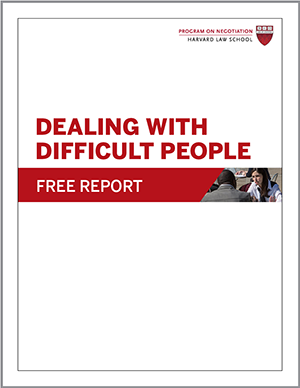
In business negotiations, we sometimes face the task of dealing with difficult people—those who seem to pick fights, hold offensive views, or rely on hard-bargaining tactics. Some of us naturally turn away from such difficult negotiations. Others choose to try to overlook or overcome the flaws they see in potential negotiating partners.
Republican Congressman Steve Scalise of Louisiana falls into the latter category. According to Scalise’s friends and associates, “He will go anywhere, and talk to anyone,” writes Jason Horowitz in a recent profile of the representative in the New York Times.
Scalise’s apparent willingness to negotiate and communicate with anyone has had pros and cons. On the one hand, after joining the house in 2008, he climbed the ladder to become the House “whip”—as the third-ranking Republican—thanks in good part to his ability to forge connections and build relationships. The 49-year-old Scalise is known as a moderate conservative who has built a reputation as a bridge-builder between House Speaker John Boehner and far-right Republicans.
But Scalise’s seeming desire to seek common ground with virtually anyone has also gotten him into trouble. Late last year, the news leaked that in 2002, Scalise had addressed a group of white supremacists affiliated with former Ku Klux Klan leader David Duke. At the time, Scalise was a Louisiana state legislator who lived next door to Kenneth Knight, Duke’s top aide, near New Orleans. Knight says that Scalise agreed to give the brief opening speech at a conference as a favor to him, according to the Washington Post.
Scalise has said he did not know at the time that he was addressing a group of racists and neo-Nazis. Knight agreed that this was probably the case, though he told the Post that Scalise “knew who I was, but I don’t think he held it against me.” No other evidence exists that Scalise holds bigoted views or supports racist groups; his former colleague in the Louisiana legislature, Representative Cedric Richmond, told the Times that Scalise does not have “a racist bone in his body.”
Whatever the true facts of the incident, it raises the broader question for leaders and negotiators handling tough situations: Should we engage with or shun people whose views we abhor?
In his 2010 book Bargaining with the Devil: When to Negotiate, When to Fight (Simon & Schuster, 2010), Program on Negotiation Chair Robert Mnookin analyzes this common dilemma. He notes that honor, integrity, and identity can and should be significant factors when we are deciding how to deal with difficult people whom we believe to be repugnant. But because such emotional, moral judgments tend to arise from the intuitive side of the brain, they deserve greater scrutiny. Moral judgments should “involve an interaction between intuition and analysis,” writes Mnookin.
Related Article: Nelson Mandela – Lessons from a “Master” Negotiator




